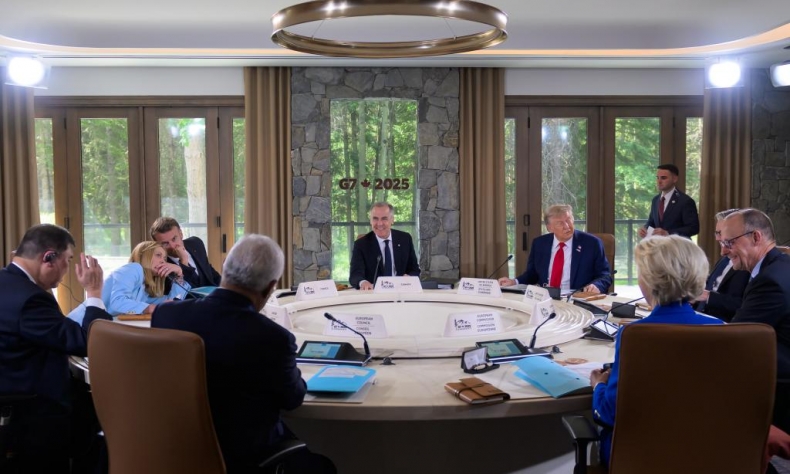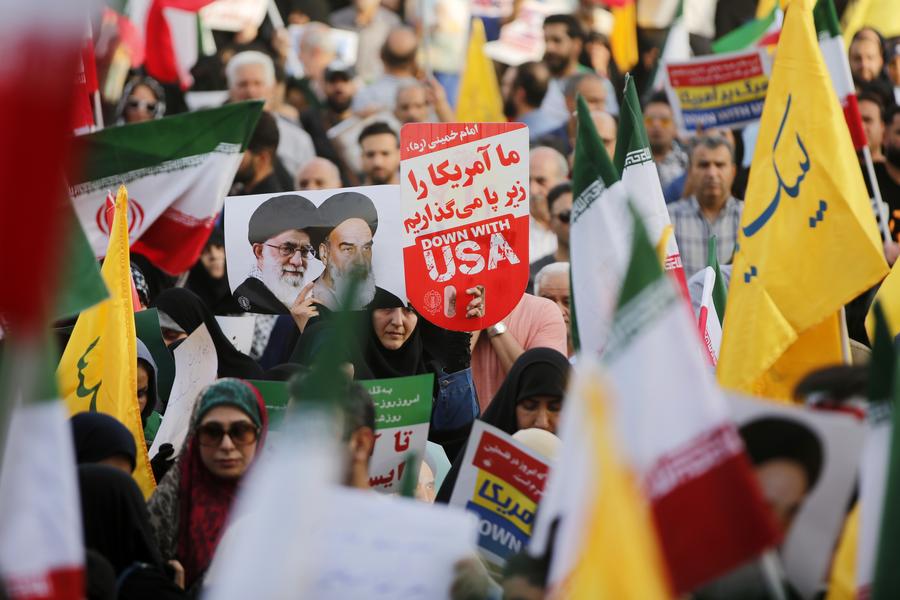Shadows Over Summit Tables

The latest aggression toward Iran led by the U.S. has exposed the decline of U.S. hegemony.
In a span of two weeks, the Group of Seven (G7) and NATO summits were sidelined in Western media headlines by an unprecedented escalation: the Israel-Iran war. Not in a generation had the world come so close to an all-out war in West Asia. U.S. strikes and Israeli attacks coupled with Iran’s response in the form of Operation True Promise 3 threatened to further destabilize the region and sink the global economy. While the war ended in a U.S.-brokered ceasefire on June 23, the impact of the “12-day war” will forever shape the geopolitical landscape.
Donald Trump ran for president in 2024 on two key pillars: the weakening of historic alliances with the West and a scale back in U.S. interventionism. In many ways, the Israel-Iran war has inadvertently accomplished the former but not the latter. Trump’s administration has deprioritized NATO and the G7’s collective goal of sharing in the fruits of U.S. hegemony for a “go-it-alone” approach that further subordinates Europe to U.S. dictates. This was seen quite clearly in France, Norway and several European countries’ opposition to U.S. strikes on Iran’s nuclear facilities on June 22.
However, audiences should not be fooled by the theater of divisions manifesting between the Trump administration and other Western states. The Israel-Iran war was in reality an American war of aggression that required the full weight of the U.S. imperial apparatus to conduct.
The ceasefire brokered by the U.S. and Qatar represents a retreat from a U.S. war that threatened to plunge both the Trump administration and the world economy into a historic crisis. New American intelligence leaked to Western media suggests that the U.S. strikes on Iran were unsuccessful in eradicating its civilian nuclear program. In other words, the strikes were as ineffective as they were illegal. Furthermore, Operation True Promise 3 dealt an unprecedented military and financial blow to Israel as hundreds of Iranian ballistic missiles exposed Israel’s weakened air defenses. While Israel claimed the lives of nearly 1,000 Iranians using Iraqi and Azerbaijani airspace to conduct strikes on west Iran, the threat of long-term damage to Israel coupled with the possibility of Iran taking further economic retaliation in the form of closing the Strait of Hormuz proved too costly for a Trump administration that risked losing key political support at home over another regime change war.

And that’s exactly what the Israel-Iran war was: a regime change operation. Iran’s so-called nuclear “threat” was simply a long-time pretext brought to its logical conclusion. Since 1979, the U.S. has sought to overthrow Iran’s sovereign government. Military contractors, U.S. and Israeli officials and intelligence operatives, and the political establishment in the West as a whole have viewed Iran’s political system as a counterweight to their regional interests. In the eyes of U.S. elites, Iran’s support for Palestine and its refusal to allow its massive oil and gas reserves to come under Western dominion, as well as its commitment to a multipolar partnership with Russia, China and the Global South at large cannot be allowed to stand.
The latest aggression toward Iran led by the U.S. has exposed the decline of U.S. hegemony. Iran did not fall from U.S.-Israeli military maneuvers despite how deeply they interfered and disrupted its internal affairs at a great cost to the Iranian people. Iranians celebrating in the streets after the ceasefire demonstrates a society more united than ever to defend the country from external aggression.
However, a weakened U.S. hegemony remains dangerous still. Setbacks in U.S. foreign policy goals do not lead to a change of heart in the country’s political establishment. In a world where the U.S. condemns a “nuclear Iran” while remaining the only nation to have ever used atomic weapons in war, this declining hegemony’s potential for escalating aggression remains dangerously real.
It is for this reason that peace-loving people and nations must act swiftly to create the conditions of deterrence and peace, which can protect the rights of nations to develop and build their own destinies free from interference.
The author is an independent journalist and researcher based in the U.S.
 Facebook
Facebook
 Twitter
Twitter
 Linkedin
Linkedin
 Google +
Google +










